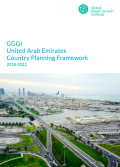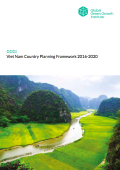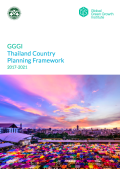This study evaluates options by which the Indian economy can move towards an inclusive green growth paradigm of development. It combines the rigorous scientific and economic studies done at the national and state levels (Punjab and Himachal Pradesh). The objective of this analysis is to understand the impact in India of energy-related green growth interventions on future energy demand, emissions, energy access, energy security, and development indicators.
This case study, Entry Points for Mainstreaming Ecosystem-based Adaptation - The Case of Philipines , is conducted by GIZ in Philipines to understand the entry points of Ecosystem-based Adaptation (EbA), and who were the pivotal parties, and how EbA can be further expanded in each country in the future. This study also stresses the importance of including EbA in the Climate Change Cluster on Adaptation and MitigationDisaster Risk Reduction agenda.
This case study, Entry Points for Mainstreaming Ecosystem-based Adaptation - The Case of South Africa , is conducted by GIZ in South Africa to understand the entry points of Ecosystem-based Adaptation, and who were the pivotal parties, and how EbA can be further expanded in each country in the future. This report is a comprehensive review of existing policy and strategy was made, which was followed by a set of interviews with parties located in government as well as private sector organizations who have often led on-the-ground activities to date.
This case study, Entry Points for Mainstreaming Ecosystem-based Adaptation - The Case of Mexico , is conducted by GIZ in Mexico to understand the entry points of Ecosystem-based Adaptation, and who were the pivotal parties, and how EbA can be further expanded in each country in the future. This report is a comprehensive review of existing policy and strategy was made, which was followed by a set of interviews with parties located in government as well as private sector organisations who have often led on-the-ground activities to date.
This case study, Entry Points for Mainstreaming Ecosystem-based Adaptation - The Case of Peru , analyses the enabling and hindering factors with regards to the institutional setting, policy and legal framework as well as capacity and awareness, and shares lessons learned on Ecosystem-based Adaptation mainstreaming in Peru.
A Case Study on the Development of Technical Guidelines for Greenhouse Gas Reporting in South Africa
This report forms part of a project that aims to develop technical guidelines for greenhouse gas (GHG) emissions reporting in South Africa. It describes the lessons learned in building guidance for mandatory GHG reporting in a country that has shown leadership in voluntary corporate GHG reporting.

To support Ministry of Construction (MOC) to implement the NDC, the Global Green Growth Institute (GGGI) has conducted an assessment of the potential green city actions that would help achieve Viet Nam’s NDC commitments. This paper, Achieving Viet Nam’s NDC in the Urban Sector, outlines the findings from the assessment in two sectors contributing the majority of urban GHG emissions: waste and energy.

This Country Planning Framework (CPF) sets the strategic direction for the Global Green Growth Institute (GGGI) in the United Arab Emirates (UAE) over the period 2018-2022.

This Country Planning Framework (CPF) sets the strategic direction for the Global Green Growth Institute (GGGI) in Vietnam over the period 2016 to 2020.

This Country Planning Framework (CPF) sets the strategic direction for the Global Green Growth Institute (GGGI) in Thailand over the period 2017-2021.
